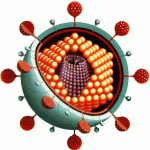Virology
|
30 may 2012 21:31:58 |
| Parasite-mediated interactions within the insect vector: Trypanosoma rangeli strategies (Parasites & Vectors) |
|
Tweet Trypanosoma rangeli is a protozoan that is non-pathogenic for humans and other mammalsbut causes pathology in the genus Rhodnius. T. rangeli and R. prolixus is an excellent modelfor studying the parasite-vector interaction, but its cycle in invertebrates remains unclear. Thevector becomes infected on ingesting blood containing parasites, which subsequently developin the gut, hemolymph and salivary glands producing short and large epimastigotes andmetacyclic trypomastigotes, which are the infective forms. The importance of the T. rangelicycle is the flagellate penetration into the gut cells and invasion of the salivary glands. Theestablishment of the parasite depends on the alteration of some vector defense mechanisms.Herein, we present our understanding of T. rangeli infection on the vector physiology,including gut and salivary gland invasions, hemolymph reactions and behavior alteration. |
| 149 viewsCategory: Epidemiology, Microbiology, Virology |
 Efficacy of an imidacloprid/flumethrin collar against fleas, ticks, mites and lice on dogs (Parasites & Vectors) Efficacy of an imidacloprid/flumethrin collar against fleas, ticks, mites and lice on dogs (Parasites & Vectors)A gallery of the key characters to ease identification of Dermanyssus gallinae (Acari: Gamasida: Dermanyssidae) and allow differentiation from Ornithonyssus sylviarum (Acari: Gamasida: Macronyssidae) (Parasites & Vectors) 
|
| blog comments powered by Disqus |
MyJournals.org
The latest issues of all your favorite science journals on one page
The latest issues of all your favorite science journals on one page



